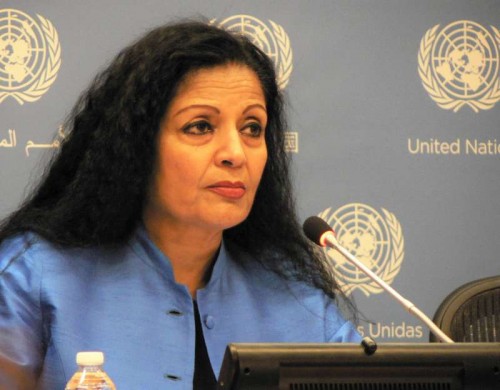Making the care of children, the elderly and the sick into economically paying jobs could become an engine of employment benefiting at least one billion women worldwide, according to Laxmi Puri, a ranking UN official on women’s issues….writes Arul Louis

At the release of a report on the status of women, Puri called for “creating a vibrant new paid care economy” that would benefit women, who are doing most of the unpaid work of caring for children, the elderly and the sick, while mired in poverty.
“If investments were made in quality paid care services, as is happening in some countries, this could meet care needs, reduce unpaid care burdens and become an engine of employment creation while also empowering at least a billion women,” she told reporters here.
The report said, “Women still carry the burden of unpaid care work, which austerity policies and cutbacks have only intensified.”
“We are demanding nothing less than a new economic agenda and transformation,” said Puri, a former Indian diplomat who is now an assistant secretary-general and the deputy executive director of UN Women, the world body’s arm dedicated to gender equality and the empowerment of women.
She said paid and unpaid work for women should be transformed to provide “equal access to paid work, decent work with social protection, fair and adequate earnings and equal sharing of unpaid care work.”
These are some of findings in the report, “Progress of the World’s Women, 2015-2016: Transforming Economies, Realising Rights:”
* The percentage of women in paid jobs in India had fallen from 34.8 percent to 27 percent between 1990 and 2013. This happened during a period of rapid economic growth in the nation. The numbers for India were among the lowest outside of the Arab world. Globally the percentage of women in paid jobs declined a little, from 52.3 to 50.3 percent.
* In India, the gender pay gap or how much less women were paid than men, was 32.6 percent compared to 23.5 percent world-wide.
* In the Indian poverty alleviation program in India, the National Rural Employment Guarantee Scheme, almost 50 percent of the participants in were women.
* World-wide 83 per cent of domestic workers are women and almost half of them are not entitled to the minimum wage.
Myrtle Witbooi, president of the International Domestic Workers Federation, made a plea for implementing the International Labour Organisation convention on the rights of household workers. A one-time domestic worker herself, she said that their tremendous contribution to the economy should be adequately recognised.
Through their supportive role, domestic workers were the ones who made it possible for those in key positions to perform their jobs, she said. “I don’t need your degree,” she said of the role of domestic workers. “I have my degree in the kitchen.”
India, along with the United States, Britain and other major countries have not ratified the ILO convention, which came into force in 2013. It seeks to ensure minimum, non-discriminatory wages, and to provide them a safe and healthy working environment.